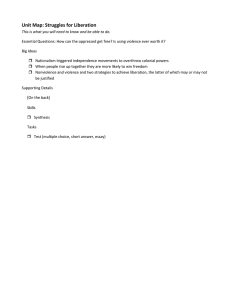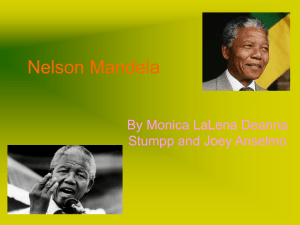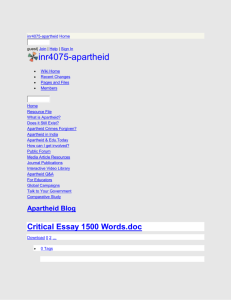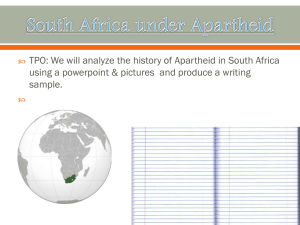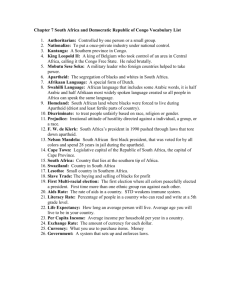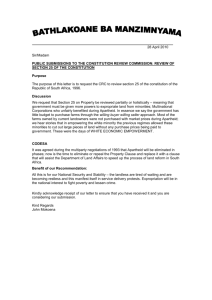Speech by the Executive Mayor of Cape Town,
advertisement
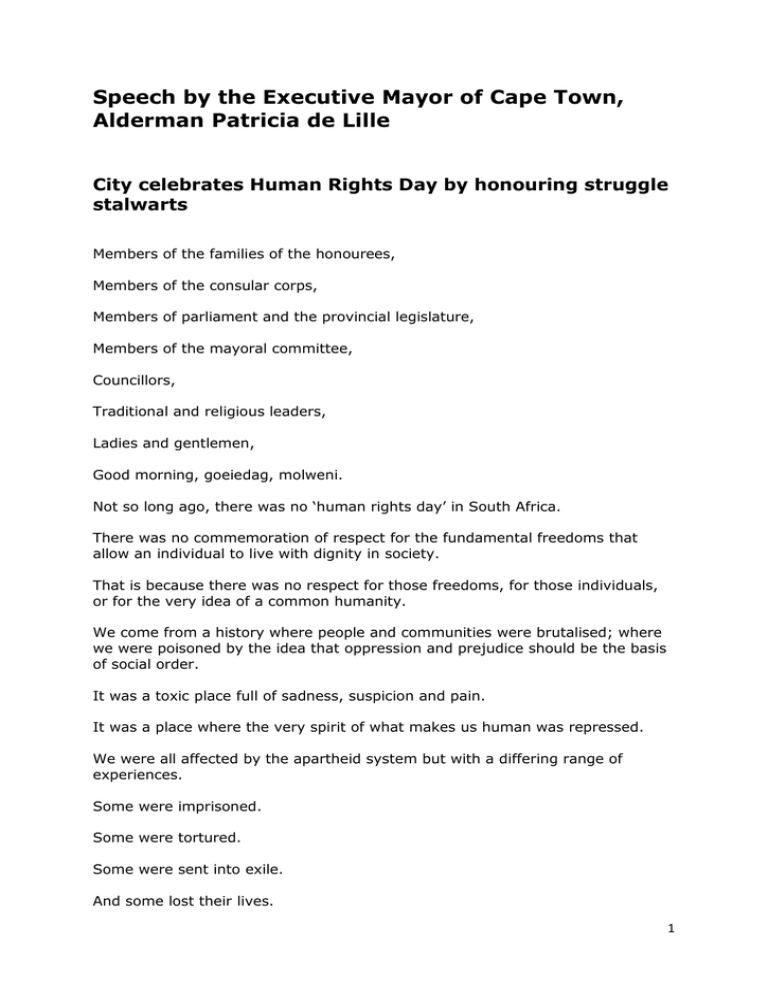
Speech by the Executive Mayor of Cape Town, Alderman Patricia de Lille City celebrates Human Rights Day by honouring struggle stalwarts Members of the families of the honourees, Members of the consular corps, Members of parliament and the provincial legislature, Members of the mayoral committee, Councillors, Traditional and religious leaders, Ladies and gentlemen, Good morning, goeiedag, molweni. Not so long ago, there was no ‘human rights day’ in South Africa. There was no commemoration of respect for the fundamental freedoms that allow an individual to live with dignity in society. That is because there was no respect for those freedoms, for those individuals, or for the very idea of a common humanity. We come from a history where people and communities were brutalised; where we were poisoned by the idea that oppression and prejudice should be the basis of social order. It was a toxic place full of sadness, suspicion and pain. It was a place where the very spirit of what makes us human was repressed. We were all affected by the apartheid system but with a differing range of experiences. Some were imprisoned. Some were tortured. Some were sent into exile. And some lost their lives. 1 While suffering is a relative concept, there can be no doubt that some paid a very high price for the luxury of not only celebrating but enjoying human rights. As I considered the honour-roll of the people we are recognising today, I was faced with the challenge of identifying a common theme among such great individuals. I came up with a few: heroism. Selfless sacrifice. And fighting for common freedom. These are powerful concepts, so powerful that we feel the effect of these individuals with us to this very day and will do so far into the future. As part of the City’s policy of redress and reconciliation, we have taken to honouring our common history and those who fought for it. We have chosen to do so by an open and collaborative process, the most open in the country, of naming and renaming public spaces and places to accurately portray our nation’s rich heritage. We have already done a great deal to execute this policy, which has as its ultimate aim the unification of this great city and its many cultural identities. We have already recognised such great South Africans as former president Nelson Mandela; Helen Suzman; Steve Biko; and Christiaan Barnard. Today, in an event that is the first of its kind for Cape Town, we enter the next phase by recognising a collection of our heroes on this very special national holiday. They have helped make South Africa a place of freedom, dignity and human rights and made, through their sacrifice, this great nation what it is today. Each of them has been individually commemorated in the packs before you today. Roburt Sobukwe was the founder of the Pan African Congress. He articulated a philosophy of freedom that envisioned the liberation of Africans without prejudicing any racial group. He was imprisoned on Robben Island for political beliefs. Govan Mbeki was one of the leaders of worker consciousness in South Africa. A champion of the rights of the poor, a communist and MK fighter, he was imprisoned for political crimes. Walter Sisulu was one of the most important members of the ANC throughout its long history, helping to reorganise the party once it was unbanned in the early 1990s and a great partner of former president Mandela. 2 He was imprisoned for political beliefs. Dulcie September was a community activist and lobbyist for sanctions against the apartheid regime. Serving under threatened conditions, she was eventually assassinated because of her work by the apartheid regime. Imam Haron was a religious leader motivating for human rights awareness, rights and community education. He died while in police custody under circumstances that would become all too familiar during the later apartheid years. Uys Krige fought fascist governments in Europe and the very same crimes he saw repeated by the apartheid regime in his home country. A noted cultural champion who advanced the interests of language and education, he died in 1987. Japtha K Masomela was a member of the PAC and one of the founding members of the PAC’s armed struggle against apartheid. He refused to surrender his principles for an early release and was imprisoned for decades for political beliefs. Each of these individuals did so much to make the South Africa we enjoy today possible. Their lives of achievement, of sacrifice, are lessons not only for us but for our children. They remind us that the causes of human rights and dignity are not to be taken for granted. Though commonly enjoyed today, it is only because they were one by people like the heroes that we honour today. We are fortunate to have family members representing them here today and to them I say: thank you on behalf of a grateful city. In conclusion, this process of naming and renaming is a process of transforming Cape Town from a place of divided histories to a shared future. The spaces in which we live influence our perceptions. The apartheid government knew full well what it meant to claim ownership of public spaces. Through a careful strategy of selective naming and cultural recognition, it sought to stamp its interpretation of the world on future generations. 3 It was a campaign to own history. Our naming and renaming process is a way of reclaiming our common history and changing our very way of thinking and, in so doing, recognising our shared past. While the people celebrated here today may no longer be with us, their struggle will remain, honoured each and every day by bearing their names across the grids of this metro. Thank you, baie dankie, enkosi. 4

